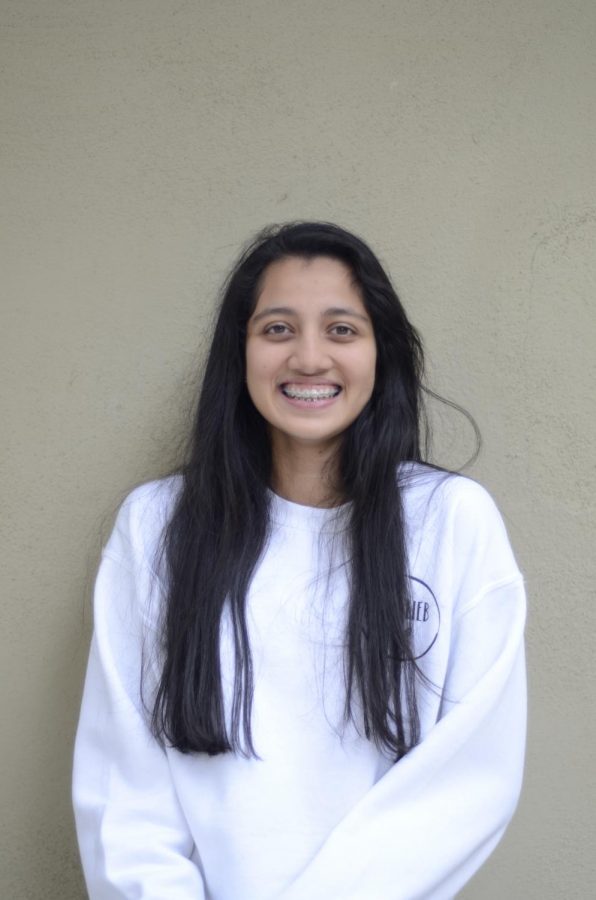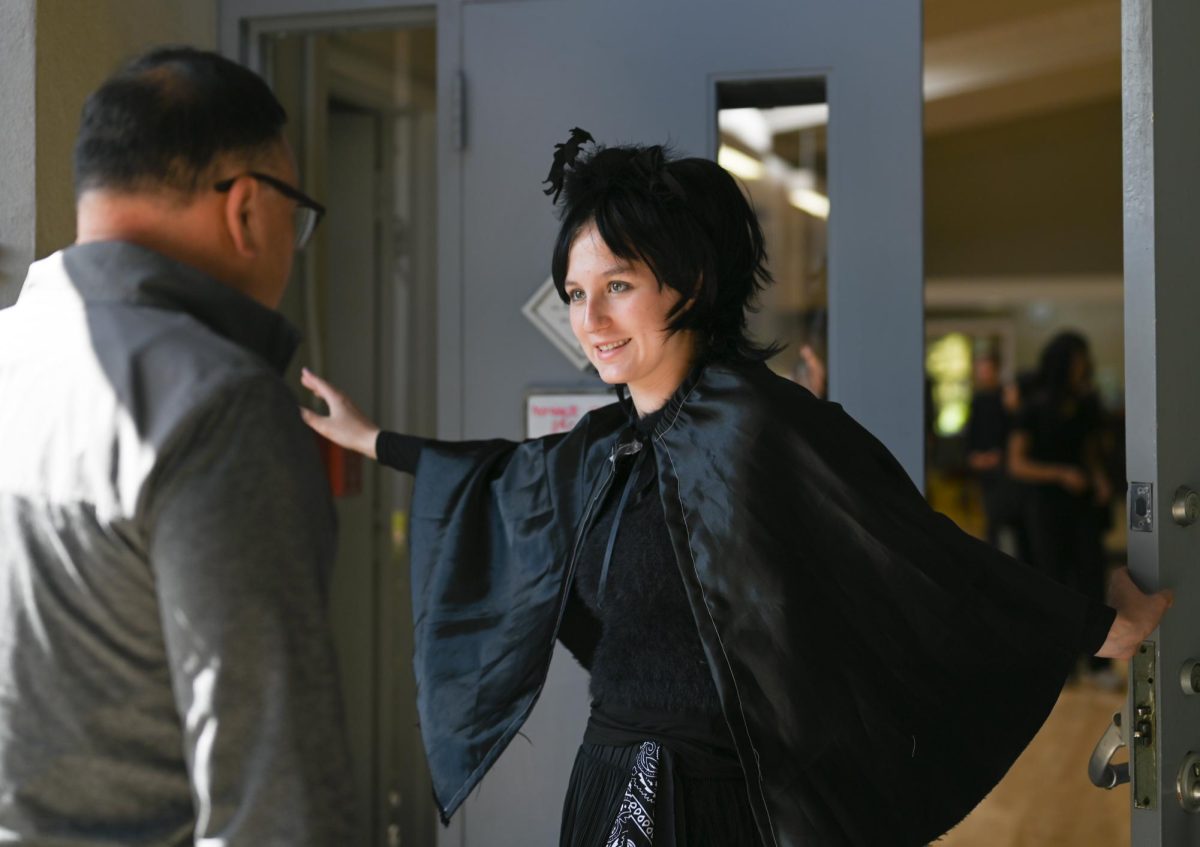Staying healthy with Saloni: Get some sleep!
Saloni Shah (10) discusses health and mental wellness in her new column, Staying Healthy with Saloni.
December 9, 2018
Why can’t we be like wild African elephants?
For real, they only sleep for two hours a day. That would leave us 22 hours in the day to accomplish everything on our to-do list, so we wouldn’t go to school with dark circles under our eyes, fatigue, blurred vision and disorientation.
Looking around at the stoplight at I-280 and Saratoga Avenue every morning, I see many cars with dozing Harker students who are trying to catch some zzz’s. I have yet to see students cheerful and engaged in conversation with their parents in the morning.
Let’s admit it. Sleep-deprived teens are cranky, are less able to learn new information, have longer reaction times and may have behavioral changes or mental health problems. There we go, I said it.
Kudos to the seniors and juniors who can drag themselves out of bed and drive alone to school every morning. Driving requires a high level of alertness which is quite a rare commodity for sleep-deprived teenagers. A study conducted by JAMA in 2013 amongst young drivers between the ages of 17-24 reported that sleeping less than 6 hours per night had an increased risk for a car crash. So, avoiding drowsy driving is a good plan.
Alright, other ideas. What about early start times? Early school start times have been debated, petitioned, bills drawn, passed and vetoed, and local high schools have their own varied start times ranging from 7:15 a.m. for Los Altos High and Mountain View High for zero period to as late as 9:00 a.m for Alta Vista High. According to The American Academy of Pediatrics (AAP), teenagers need nine hours of sleep every night and recommends late school start times.
A recent study from AAP revalidated a previous correlation found between obesity in teenagers and lack of sleep. According to the study, teens who didn’t sleep enough were likely to be more obese and at higher risk for cardiovascular disease, high blood pressure and diabetes.
Larger animals need more food, so they eat more and end up sleeping less. Maybe this proves the research studies that link less sleep to obesity in adolescents? I guess we can’t be wild African elephants after all.
I tend to compensate for having less sleep on weeknights by sleeping in late on weekends. But, according to a study by the National Sleep Foundation compensating for sleep is also not a good idea. Sleeping for longer in order to compensate for six hours a night actually causes worse reaction times than pulling an all-nighter.
Whoops. I’ll fix that.
Our lives are dictated by technology, which can lead to harmful effects on our sleep. Texting. Instagramming. Snapchatting. Facebooking. Tweeting. Whatever else-ing. Limiting the use of technology during or before sleeping can limit distractions. Frequent notifications from mobile phones signaling email, social media alerts and text messages also affect sleep and the quality of sleep.
Okay, so let’s stop and think. We high schoolers tend to consider eight hours of sleep as unproductive when we have the pressure of schoolwork and activities and grades. We smirk and roll our eyes when we are told that teens need eight to nine hours of sleep, thinking it’s a waste of our precious limited resource. But, getting sufficient sleep makes us more productive in the long run and leads to an improvement in our physical and emotional well-being and better grades.
Saloni Shah (10) discusses health issues in her column, Staying healthy with Saloni. So, long story short, get sleep. It’s good for you. Since we aren’t four-legged, massive, wild African elephants, let’s catch some zzz’s.
This piece was originally published in the pages of The Winged Post on December 6, 2018.


















![“[Building nerf blasters] became this outlet of creativity for me that hasn't been matched by anything else. The process [of] making a build complete to your desire is such a painstakingly difficult process, but I've had to learn from [the skills needed from] soldering to proper painting. There's so many different options for everything, if you think about it, it exists. The best part is [that] if it doesn't exist, you can build it yourself," Ishaan Parate said.](https://harkeraquila.com/wp-content/uploads/2022/08/DSC_8149-900x604.jpg)




![“When I came into high school, I was ready to be a follower. But DECA was a game changer for me. It helped me overcome my fear of public speaking, and it's played such a major role in who I've become today. To be able to successfully lead a chapter of 150 students, an officer team and be one of the upperclassmen I once really admired is something I'm [really] proud of,” Anvitha Tummala ('21) said.](https://harkeraquila.com/wp-content/uploads/2021/07/Screen-Shot-2021-07-25-at-9.50.05-AM-900x594.png)







![“I think getting up in the morning and having a sense of purpose [is exciting]. I think without a certain amount of drive, life is kind of obsolete and mundane, and I think having that every single day is what makes each day unique and kind of makes life exciting,” Neymika Jain (12) said.](https://harkeraquila.com/wp-content/uploads/2017/06/Screen-Shot-2017-06-03-at-4.54.16-PM.png)








![“My slogan is ‘slow feet, don’t eat, and I’m hungry.’ You need to run fast to get where you are–you aren't going to get those championships if you aren't fast,” Angel Cervantes (12) said. “I want to do well in school on my tests and in track and win championships for my team. I live by that, [and] I can do that anywhere: in the classroom or on the field.”](https://harkeraquila.com/wp-content/uploads/2018/06/DSC5146-900x601.jpg)
![“[Volleyball has] taught me how to fall correctly, and another thing it taught is that you don’t have to be the best at something to be good at it. If you just hit the ball in a smart way, then it still scores points and you’re good at it. You could be a background player and still make a much bigger impact on the team than you would think,” Anya Gert (’20) said.](https://harkeraquila.com/wp-content/uploads/2020/06/AnnaGert_JinTuan_HoHPhotoEdited-600x900.jpeg)

![“I'm not nearly there yet, but [my confidence has] definitely been getting better since I was pretty shy and timid coming into Harker my freshman year. I know that there's a lot of people that are really confident in what they do, and I really admire them. Everyone's so driven and that has really pushed me to kind of try to find my own place in high school and be more confident,” Alyssa Huang (’20) said.](https://harkeraquila.com/wp-content/uploads/2020/06/AlyssaHuang_EmilyChen_HoHPhoto-900x749.jpeg)











